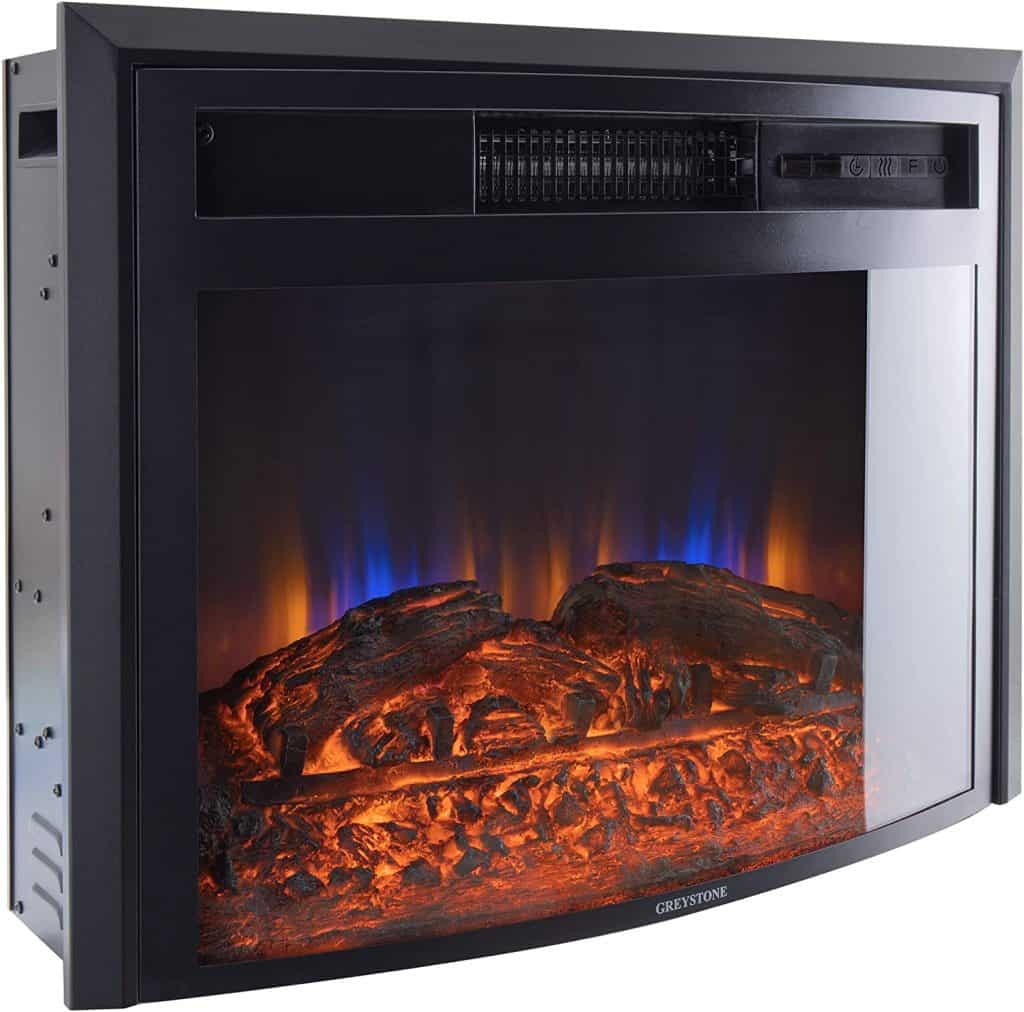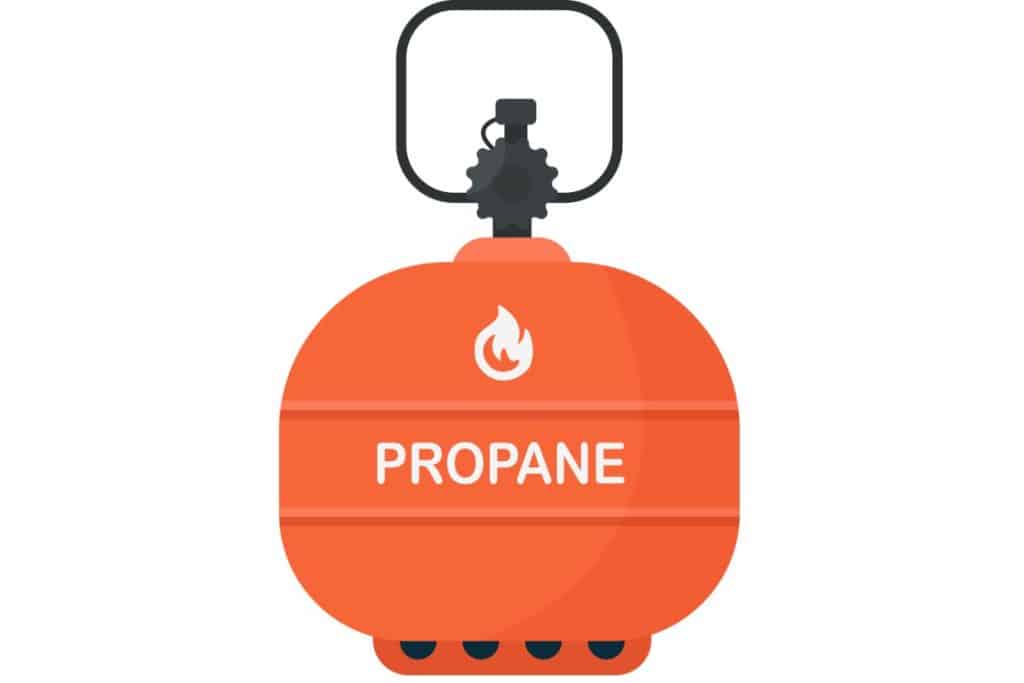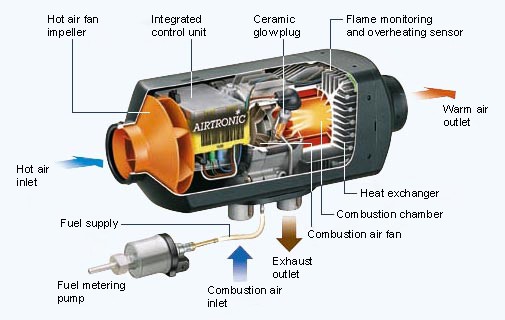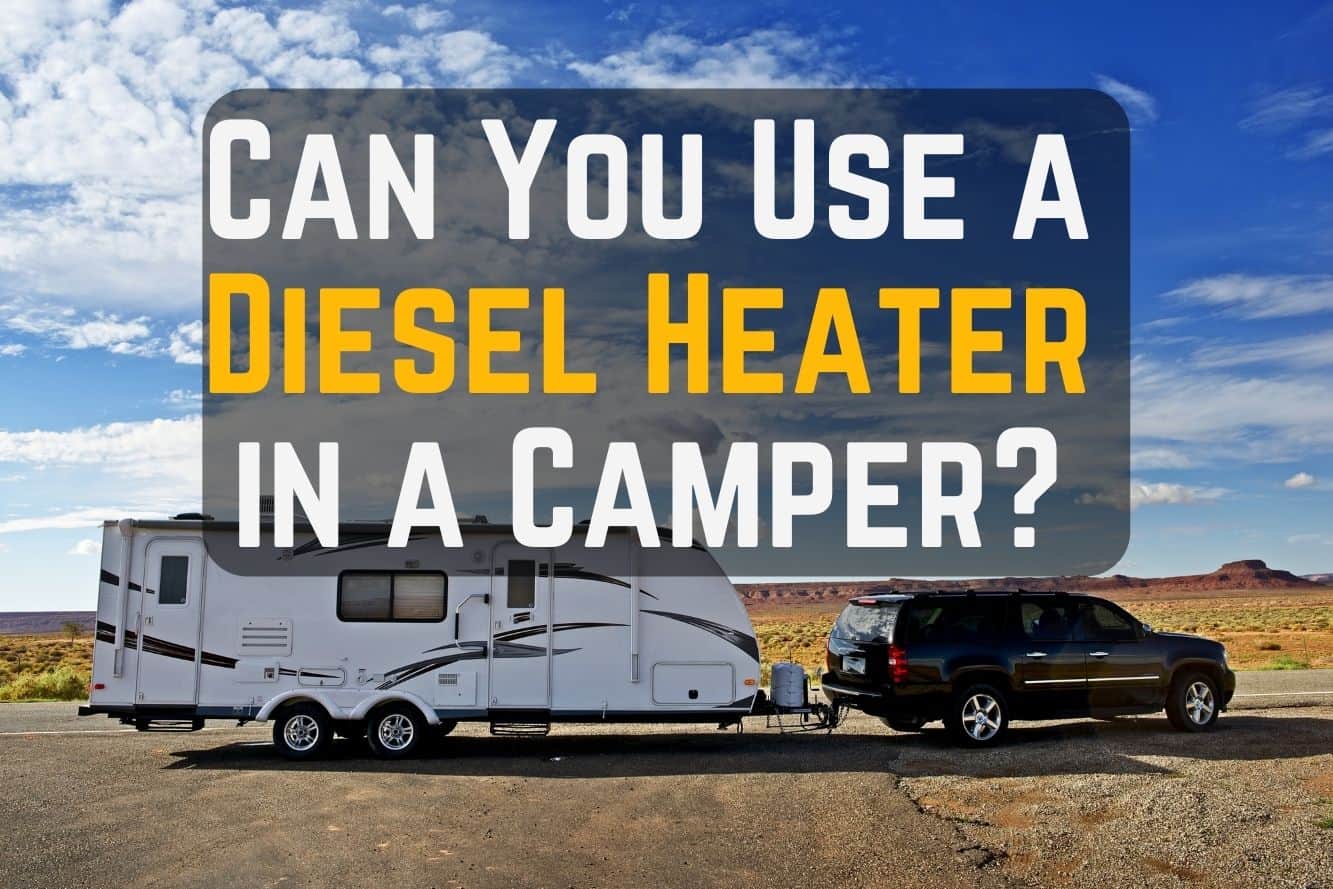Can you use a diesel heater in a camper trailer or motorhome? And are diesel heaters safe for camper trailers and motorhomes?
The answer to both of these questions is an absolute YES! But we’re providing a lot more information, details, and answering some FAQ in this article.
In this post, you’ll learn:
In this post, you’ll learn:
- Standard types of RV camper heating and the disadvantages of propane
- How diesel forced air heaters work
- What sizes diesel heaters come in for camper trailers and motorhomes
- Diesel heater pricing
- Pros and cons of installing a diesel heater in a camper trailer or motorhome
… and more! Let’s dive in now.
This post may contain affiliate links, meaning if you make a purchase after clicking a link on our website, we may earn a small commission at no extra cost to you.
Table of Contents
Can You Use a Diesel Heater in a Camper Trailer or Motorhome?
Yes, you can use diesel heaters in camper trailers, motorhomes, and camper vans. Although you don’t hear about them in the RV world much, they are a very popular heating source for camper vans!
There are a lot of benefits of using a diesel heater in an any type of RV, especially if you’re an avid boondocker or like to camp off the grid a lot.
Although they’re not talked about a whole lot in the RV world, we think that will change in the very near future. Diesel heaters are efficient, safe, and growing in popularity. They make a great heater for campers and vans!
Typical Heat Sources in Camper Trailers and Motorhomes
RVs these days come with propane or electric heaters, and many times there are a combination of both. Even the most budget-friendly travel trailers these days come standard with electric heater fireplaces!
Propane RV Furnace
Many camper trailers and motorhomes come with a propane RV furnace. The propane furnace connects to the onboard propane tank and is typically ducted throughout the RV with floor or baseboard vents.
These furnaces use electricity to start up and for the fan blower, and they can burn through quite a bit of propane with constant use.
Electric Fireplace Heater

An electric fireplace heater is a faux-fireplace that also functions as a space heater. Many newer RVs these days come standard with an electric fireplace somewhere in the main living area, usually below or near the TV or entertainment center.
Electric fireplace heaters use a lot of electricity and should never be left unattended.
Propane Catalytic Heaters
You’ll find catalytic propane heaters in older campers, smaller campers, and many RVers install them as a DIY heat source.
These heaters are not forced-air heaters like a furnace is, they simply heat the space around them. In that sense, catalytic heaters are space heaters. But when in an RV, they typically mount on the wall.
These heaters should never be left unattended.
Space Heaters: Propane and Electric
Many RVers supplement their RV furnace or replace it entirely by bringing in space heaters. You can use both electric and propane space heaters in your camper trailer or motorhome.
However, you should never leave a space heater unattended. Additionally, you should never use an extension cord or power strip with an electric space heater.
Disadvantages of Propane Heat in an RV

Propane heat is the most common heat source in an RV. Propane is a popular heating source for RVs because:
- Propane is readily available in an RV in the onboard tank.
- Propane furnaces use a relatively small amount of electricity.
- You can find propane refill stations all over the place.
- Propane is relatively inexpensive.
However, using propane to heat your RV has disadvantages.
- The average RV furnaces uses ⅓ gallon of propane for every hour of continuous use.
- Additionally, for every 1 gallon of propane burned by an RV furnace, 1.6 gallons of moisture is released into the air as water vapor.
- Condensation and humidity are major challenges for RVers in the winter and cause mold, mildew, and water damage.
- If your RV furnace uses up all your propane, you can’t cook, heat water, or run your fridge on propane.
Who Uses Diesel Heaters?
Diesel heater technology was developed in Europe in the 1940’s. Diesel forced air heaters have traditionally been used in the treatment areas of ambulances and to heat the cab compartment of semi trucks during layovers and breaks. (Source: SAE International Technical Paper)
Using a diesel air heater to heat the cab of a truck allows a trucker to stay warm and cozy without having to idle the engine.
In recent years, however, diesel forced air heaters have been exploding in popularity among the camper van, boat, and RV crowd.
How Does a Diesel Heater Work?

A diesel heater uses an electric fan to suck in cold air from outside, passes the air over a combustion chamber that burns diesel fuel to heat the air, and the resulting hot air blows out the warm air outlet into your camper or vehicle.
The diesel fuel stores in a small canister that you can mount anywhere you have space for it. Or, if your vehicle uses diesel fuel, you can have it connected directly to your fuel tank. The heater uses a fuel pump to pump the diesel into the combustion chamber where it (safely) ignites to heat the air around it.
Diesel heaters are sealed units that are very safe to use inside your rig. They have overheating sensors and the exhaust vents to the outside of your rig or vehicle.
The heat that a diesel heater produces is dry and comfortable – meaning it doesn’t release water vapor or humidity into the air like a propane heater does.
You can install a diesel heater anywhere in your rig. Most of them come with a vent cover, so you can install them behind a wall panel, under a dinette, or in any concealed space. Diesel heaters for campers and vans come in different sizes that are able to heat different sized spaces.
Diesel forced air heaters like the maXpeedingrods heater have a remote, an LCD display, and can also be controlled via an app on your phone. So you don’t even have to get out of bed to turn it on or off!
How Big of a Space Can a Diesel Heater Heat? Diesel Heater Sizes
The most common sizes of diesel heaters for camper trailers, vans, and motorhomes are 2KW, 5KW, and 8KW.
So what do these numbers mean, exactly?
The 2KW diesel air heaters produce around 3,400 to 6,800 BTUs of heat. This amount of heat is recommended for 100 square feet of space or less.
The 5KW diesel heaters can produce up to 17,000 BTU of heat. This size heater is recommended for spaces up to around 250 square feet.
Finally, the 8KW diesel heaters can produce up to 27,000 BTU. This size of heater can heat up to 1,100 square feet.
Benefits of Installing a Diesel Heater in Your Camper Trailer or Motorhome

Diesel heaters are truly amazing little heaters that produce a comfortable, dry heat that works great in camper trailers and motorhomes.
Energy and Fuel Efficient
Diesel heaters are very energy and fuel efficient, which makes them great to use off-grid or boondocking. These heaters draw off of DC power and will use between 6-10 amps to start the heater, but once it’s running they only draw 1 to 2 amps of power.
The amount of fuel they use up will vary depending on the size of the heater and how often it runs. The 2kw diesel heaters will only use an average of 150mL of fuel per hour of continuous runtime, making them very fuel efficient.
Dry, Comfortable Heat
Unlike propane which is commonly used in RVs, diesel heaters produce a comfortable dry heat that doesn’t cause excess humidity and condensation.
Propane heat contributes to mold, mildew, and water damage in campers. Diesel heaters, however, have an exhaust vent that blows outside the vehicle. The result is a warm, dry heat that won’t cause excess mold, mildew, or moisture in your camper.
Safe to Use in Camper Trailers, Vans, & Motorhomes
Diesel heaters are known to be very safe to use in camper trailers, vans, and motorhomes. They come with auto-flame and overheating sensors that shut down the unit if they become too hot or work improperly.
Additionally, when properly vented, there is no worry of carbon monoxide poisoning when you use a diesel heater in a small space.
Note: you should still use a carbon monoxide detector in your camper trailer, van, or motorhome.
Can Be Left Unattended
Diesel heaters can run continuously, even when you’re not in your rig.
Propane and electric space heaters are not safe to leave running while you’re away from your rig or sleeping.
Many DIY campervan dwellers rely on portable propane space heaters like the Mr. Buddy for heat. Since you can’t leave this heater on when you’re gone and you shouldn’t run it when you sleep, your camper will get really cold when you’re away or overnight.
Diesel heaters have a thermostat, much like a furnace. All you have to do is set your desired interior temperature, and your heater will turn on and off as needed to maintain your desired temps.
Installs Seamlessly and Looks Professional
You can install diesel heaters in a cabinet or behind a wall panel and vent into your main living area. This means the install looks seamless–unlike a space heater, you don’t even know it’s there!
Diesel heaters come with a heater vent that you can install on the wall or cabinet (or wherever you choose to install it) that looks just like a heating duct for a furnace.
Potential Drawbacks of Installing a Diesel Heater in Your RV

Just like there are pros and cons of propane heat, there are pros and cons of diesel heaters too!
Brand Name Diesel Heaters are Pricey
Brand name diesel heaters for campers are pricey – we’re talking like $1,000+ to purchase a diesel heater from a brand like Webasto or Eberspacher which are two of the leading brand names.
You can purchase generic diesel heaters on Amazon for less than $300 most of the time, though. Commonly referred to as “Chinese diesel heaters”, these generic heaters are often manufactured in China and cost hundreds of dollars less than the brand names.
Chinese diesel heaters are just as safe and effective, but they often come without warranty.
We recommend the maXpeedingrods diesel heaters and Vevor diesel heaters. They’re cost effective, they work great, and they constantly improve their products!
Installing a Diesel Heater in a Camper Trailer or Motorhome is a Big Project
Let’s face it: many RVers and travel trailer owners are pretty handy and not afraid of most DIY projects.
And many camper owners aren’t afraid to tackle the installation of a diesel heater by themselves!
There are plenty of YouTube videos that show step-by-step how it’s done.
However, the install isn’t for the faint of heart.
There are a lot of small pieces with a diesel heater and the installation will require cutting holes to the exterior of your rig. Additionally, depending on where you install it, you’ll need to cut a hole inside for your vent as well.
Some Diesel Heaters May Not Work Well At High Elevations
Like many appliances, some diesel heaters may not work well at high elevations.
The newer diesel air heaters have altitude sensors, but not all will work well if you’re at very high elevations for a long time.
Why Don’t You See Diesel Heaters Used In Campers More?
The reason we don’t see diesel heaters in camper trailers or motorhomes more is just speculation on our part, but we think it’s because they’re just not very well known.
However, that’s changing and it’s changing pretty quickly!
Especially in other countries like Australia or New Zealand, where RVs are called “caravans”.
The explosion in popularity of diesel heaters has already reached the campervan crowd, and we know many RVers who have installed them in their own campers.
We have seen diesel heaters installed in travel trailers, class C RVs, fifth wheels, camper vans or class B RVs, and even Class A motorhomes.
Wrapping Up
Diesel heaters are an efficient, safe, and relatively inexpensive way to heat your camper trailer, van, or motorhome.
Diesel heaters can even be used to heat the underbelly of your RV to prevent your pipes from freezing and make RV skirting more effective.
If you’re considering installing a diesel heater in your camper trailer or motorhome, we encourage you to go for it!
If you’re too nervous to shell out $1k for a brand name, try a cheaper option like a so-called Chinese diesel heater. You can purchase one for around $200 and install it to see how you like it.
Diesel heaters are a great option for those who love to camp in the winter, and even those who live in an RV during the winter. Especially if you want to keep boondocking throughout the colder months!


